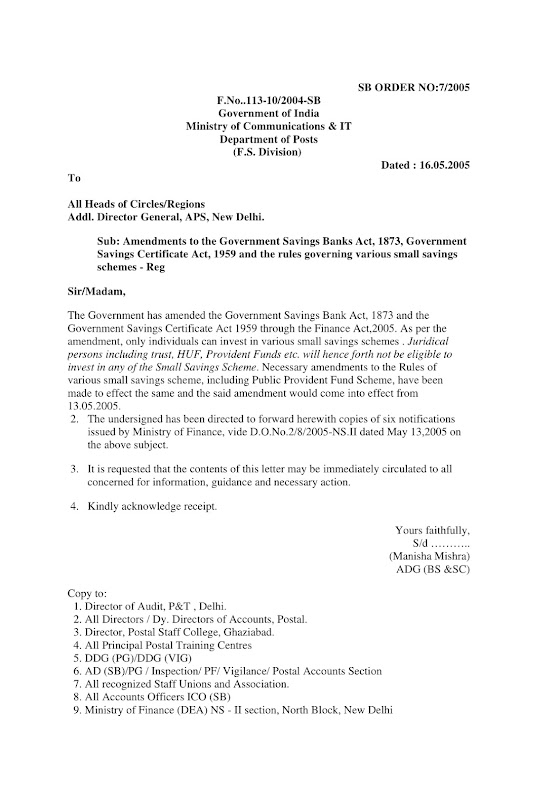No. – 57/03/2022-P&PW(B)/8361 (2)
Government of India
Ministry of Personnel, Public Grievances and Pensions
Department of Pension and Pensioners’ Welfare
***
3rd Floor, Lok Nayak Bhavan, Khan Market,
New Delhi, Dated the 28th October, 2022
Subject: Entitlement on discharge from service on account of invalidation or disablement to a Central Government servant covered under National Pension System -reg.
The undersigned is directed to say that Department of Pension and Pensioners’ Welfare has notified the Central Civil Services Implementation of National Pension System) Rules, 2021 and Central Civil Services (Payment of Gratuity under National Pension System ) Rules, 2021 which arc applicable from the date of its publication in the Official Gazette, to govern service related matters and for grant of gratuity respectively to Central Government civil employees covered under National Pension System.
2. Rule 16 and 17 of the Central Civil Services (Implementation of NPS) Rules, 2021 provides for entitlement on discharge from service on account of invalidation or disablement of a Central Government servant covered under National Pension System. Rule 16 of these rules provides that if a Central Government employee covered under National Pension System, where the provisions of section 20 of the Rights of Persons with Disabilities Act, 2016 (49 of 2016) are not applicable, intends to retire from the service on account of any bodily or mental infirmity which permanently incapacitates him for the service, he may apply to the Head of Department for benefits on retirement on invalidation. An application for benefits on retirement on invalidation may also be submitted by the spouse of the Subscriber failing which by a member of the family of the Subscriber, if the Head of Department is satisfied that the Subscriber himself is not in a position to submit such application on account of the bodily or mental infirmity.
3. The Head of Office or the Head of Department shall, within fifteen days of the receipt of application, request the specified medical authority for examination of the Subscriber within thirty days of receipt of such request. A copy of the letter requesting for examination by the medical authority shall be endorsed to the Subscriber.
4. The Subscriber shall appear before the concerned medical authority for medical examination on the date fixed by that authority. The medical authority shall examine the Subscriber to ascertain whether or not the Subscriber is fit for further service or whether he is fit for further service of less laborious character than that which he had been doing.
5. No medical certificate of incapacity for service may be granted unless the medical authority has received a request from the Head of his Office or Head of Department for medical examination of the Subscriber.
6. Where the medical authority has found a Subscriber not fit for further service or has found him fit for further service of less laborious character than that which he had been doing, it shall issue a Medical Certificate in Form 3. If the Subscriber is found to be unfit for further service, he may be granted benefits on retirement on invalidation.
7. If the Subscriber, has been found to be fit for further service of less laborious character than that which he had been doing, he shall, provided he is willing to be so employed, be employed on lower post and if there be no means of employing him even on a lower post, he may be granted benefits on retirement on invalidation.
8. Where a Subscriber, who had exercised option or in whose case the default option under rule 10 is for availing benefits under the Central Civil Service (Pension) Rules, 1972 or the Central Civil Services (1:xtraordinary Pension) Rules, and in whose case the provision of section 20 of the Rights of Persons with Disabilities Act, 2016 (49 of 2016) are not applicable, retires on account of any bodily or mental infirmity which permanently incapacitates him for the service, further action will be taken by the Head of Office for disbursement of benefits in accordance with the Central Civil Services (Pension) Rules.
9. If the Subscriber, avails the benefits under the Central Civil Services (Pension) Rules, the individual pension account of the Subscriber shall be closed and the Government contribution and returns thereon in the accumulated pension corpus of the Subscriber shall be transferred to Government account. The remaining accumulated pension corpus shall be paid to the Subscriber in lump sum.
10. Where a Subscriber, who had exercised option or in whose case the default option under rule 10 of these rules is for availing benefits under the National Pension System and in whose case the provision of section 20 of the Rights of Persons with Disabilities Act, 2016 (49 of 2016) arc not applicable, retires from the service on account of any bodily or mental infirmity which permanently incapacitates him for the service, he may be granted benefits in accordance with the Pension Fund Regulatory and Development Authority (Exits and Withdrawals under National Pension System) Regulations, 2015 as admissible in the case of exit of a Subscriber on superannuation.
11. Rule 17 of the Central Civil Services (Implementation of NPS ) Rules, 2021 provides for the entitlement available to Government servants covered under the National Pension System on boarding out from service on account of disablement. These rules provides that where a Subscriber, who had exercised option or in whose case the default option under rule 10 is for availing benefits under the Central Civil Services (Pension) Rules, 1972 or the Central Civil Services (Extraordinary Pension) Rules, is boarded out on account of disablement attributable to Government service, further action will be taken by the Head of Office for disbursement of benefits in accordance with the Central Civil Services (Extraordinary Pension) Rules.
12. If the Subscriber avails the benefits under the Central Civil Services (Extraordinary Pension) Rules, the individual pension account of the Subscriber shall be closed and the Government contribution and returns thereon in the accumulated pension corpus of the Subscriber shall be transferred to Government account. The remaining accumulated pension corpus shall be paid to the Subscriber in lump sum.
13. Where a Subscriber, who had exercised option or in whose case the default option under rule 10 of these rules 1s for availing benefits under the National Pension System, is boarded out on account of disablement attributable to Government service, he may be granted benefits in accordance with the Pension Fund Regulatory and Development Authority (Exits and Withdrawals under National Pension System) Regulations, 2015 as admissible in the case of exit of a Subscriber on superannuation.
14. If a Subscriber, who has become eligible to avail the benefits under the National Pension System under rule 16 of rule 17 of CCS(Implementation of NPS) Rules, 2021, intends to continue his Individual Pension Account or to defer payment of benefits under the National Pension System beyond the date of retirement, he shall exercise an option in this regard in accordance with the Pension Fund Regulatory and Development Authority (Exits and Withdrawals under National Pension System) Regulations, 2015.
15. In the event of discharge of a Central Government servant covered under National Pension System from service on account of invalidation or disablement and who on such discharge has availed benefits from his accumulated pension corpus under NPS, in addition to the benefits available from his accumulated pension corpus under NPS, employee would also be eligible for death gratuity in accordance with rule 22 of the Central Civil Services (Payment of Gratuity under NPS) Rules, 2021.
16. All Ministries/Departments are requested that the above provisions regarding disciplinary proceeding in respect to Central Government employees covered under National Pension System may be brought to the notice of the personnel dealing with the pensionary benefits in the Ministry/Department and attached/subordinate offices thereunder, for strict implementation.
(S. Chakrabarti)
Under Secretary to the Government of India
To
All
Ministries/Departments/Organisations,
(As per standard list)










and%20CANFIRMATION%20OF%20VACANCY%20POSITION-Regarding.jpg)








